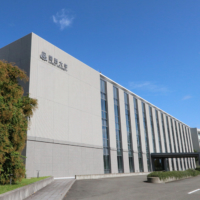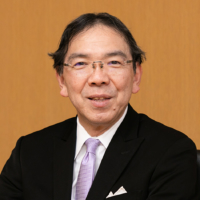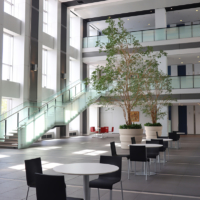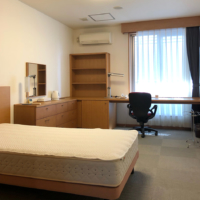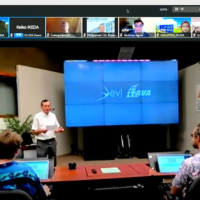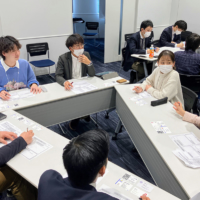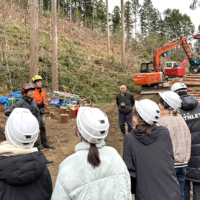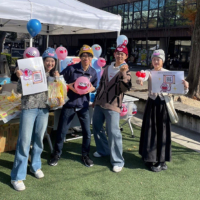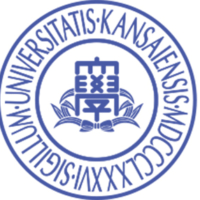Kansai University has a centurylong history as the first private university in Osaka Prefecture, founded as Kansai Law School and centered on the Senriyama Campus in the city of Suita. Its motto, “Gaku no Jitsuge” (“Harmony Between Academia and Society”), was proposed in 1922 by Juntaro Yamaoka — who had contributed greatly to the school’s establishment and was then its general trustee and president — when Kansai Law School acquired university status and became Kansai University.
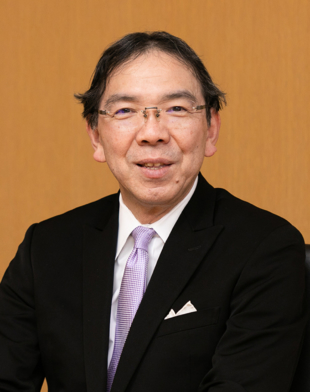
The university’s current president, Yutaka Maeda, said the motto’s significance lies in the fact that it has been advocated for 100 years now: “We have seen changes in the world of academia in the last few decades, but before that, there were gaps between research and society. As far back as 100 years ago, our motto indicated that things should not be that way, and suggested that universities should benefit society by meeting its changing needs and that society should in return pay attention to the achievements of academia.”
In keeping with its motto, the university has been growing and advancing together with society to become one of the most prestigious multidisciplinary private universities in the Kansai area. It has close to 30,000 students across 13 undergraduate faculties and 13 graduate schools, as well as two professional graduate schools: the School of Law and the School of Accountancy.
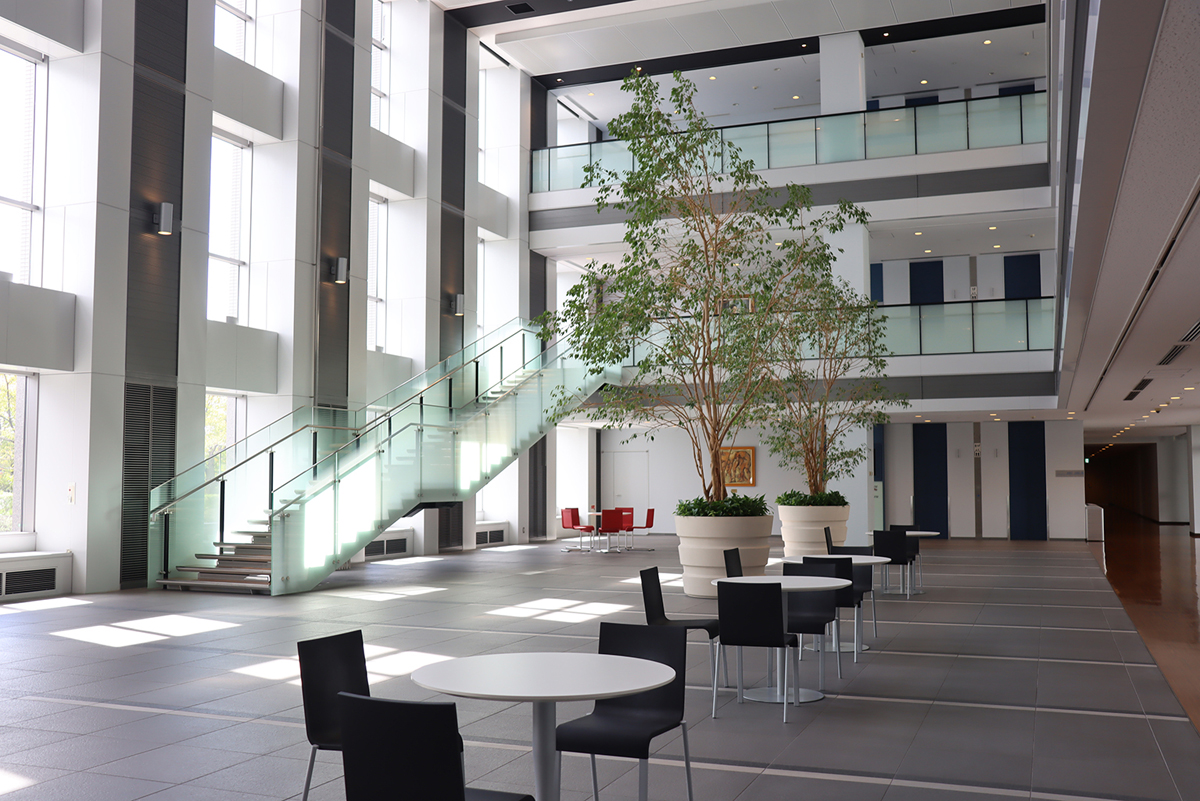
There are about 1,500 international students on campus, and about 1,200 of the Japanese students are studying abroad, primarily through the diverse programs offered via the university’s partnerships with 212 universities across the world as of April. To meet the increasing demands for accepting students from overseas and for enhancing Japanese students’ opportunities to have international experiences on campus, the university opened its fifth international dormitory at the new Suita Mirai Campus, 2.2 kilometers northeast of its main campus, last month. The dormitory, Kansai University Global House (KU G-House), has 244 private rooms for men and women on two separate floors, as well as an “all-gender unit.” It is open to both foreign and domestic students and encourages immersion in an international environment where cultural exchanges among people with different backgrounds and values take place in everyday life.
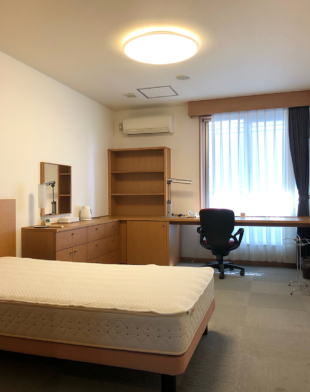
In addition to its six university campuses clustered in the Kansai area, the university also has the Minami-Senri International Plaza, which lies just 15 minutes by bicycle from the Senriyama Campus. The plaza houses the facility for the Japanese Language and Culture Program Preparatory Course, called “Bekka” for short, and a dormitory for international students.
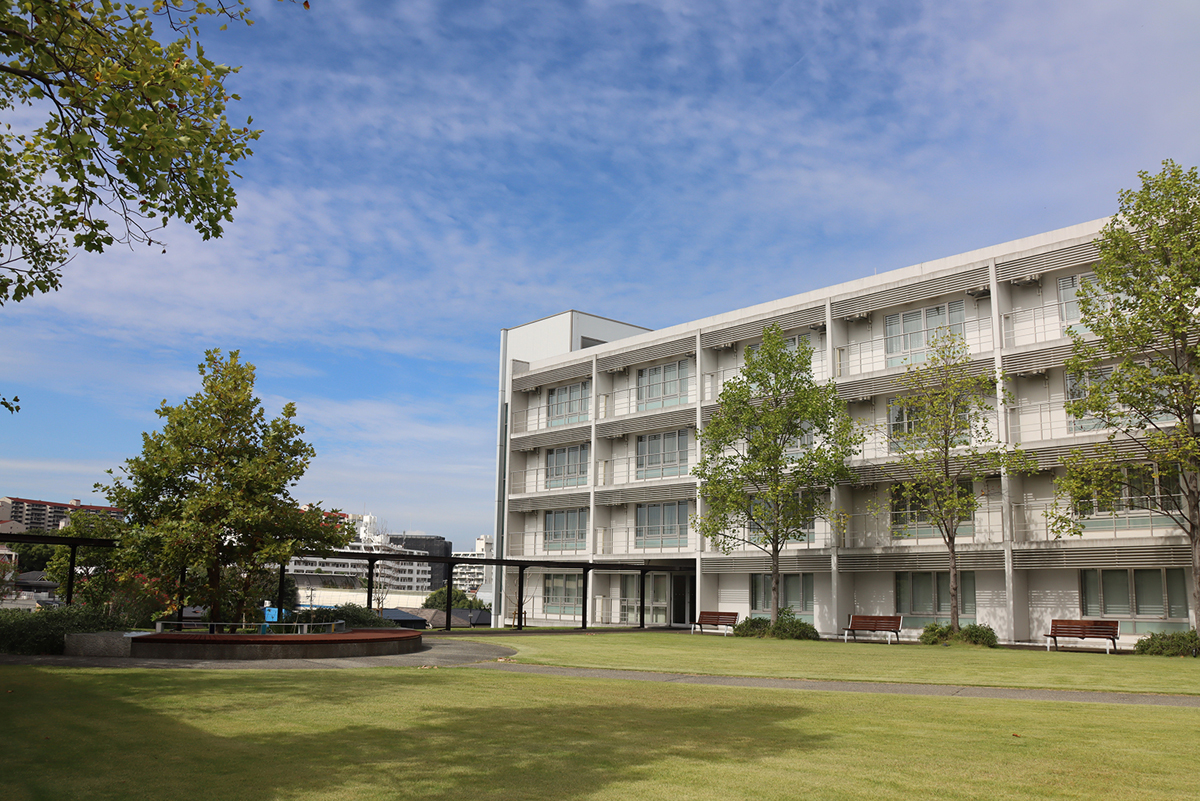
Online and international
To nurture human resources who can thrive in and contribute to a globalized society, language education has been one of the pillars of the university’s motto since a century ago. To further advance this idea, Kansai University became one of the first universities in Japan to introduce collaborative online international learning (COIL), a cost-effective method of teaching between two or more countries that was developed by the State University of New York’s COIL Center.
Since 2014, Kansai University has been collaborating with its partner universities around the world to increase the number of programs that can be taken by their students through using digital technologies. The university established the Institute for Innovative Global Education (IIGE), funded by the Ministry of Education, Culture, Sports, Science and Technology, in 2018. As a forerunner of COIL in Japan, the IIGE serves as the international secretariat of the Japan-COIL Association, which comprises 58 domestic universities, 11 supporting members and seven international chapter members as well as partner universities and institutions from around the world.
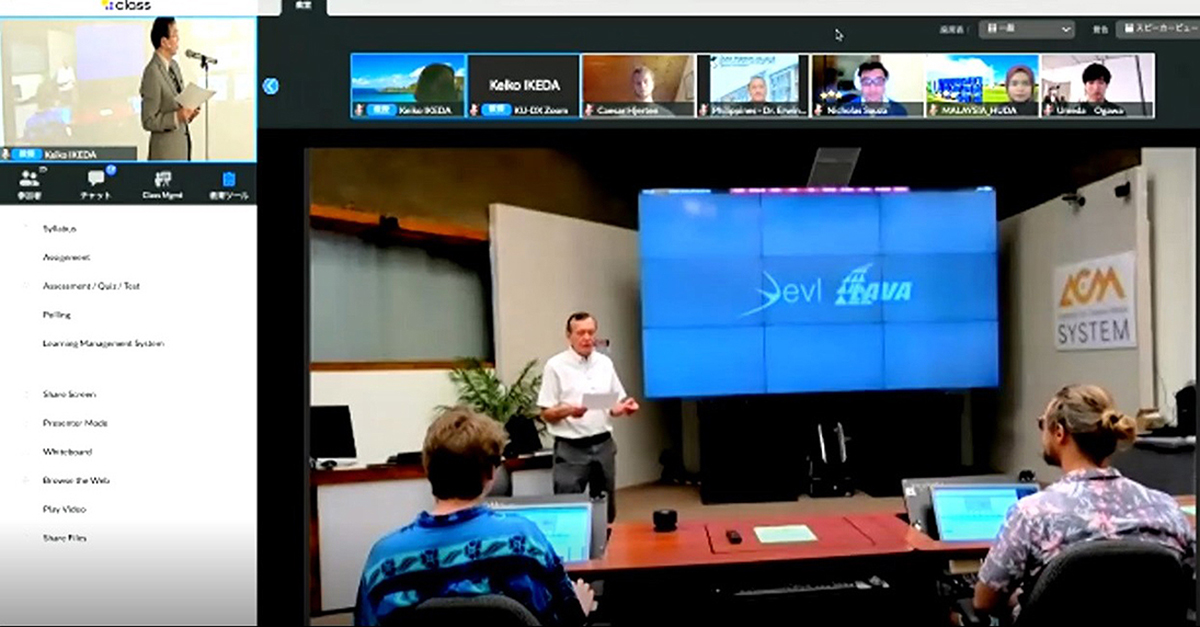
The number of programs offered under the COIL initiative has exceeded 60. “These programs are not just lecture-based. Many take a PBL (project/problem-based learning) approach whereby students from different universities team up and communicate with each other to research or create something and give a presentation together,” Maeda said. He also noted that such programs help develop relationships among faculty members across universities, providing a basis for further collaboration such as joint research.
The advantages of COIL-type education were reconfirmed by the coronavirus pandemic, when the mobility of people virtually stopped. “We were not able to accept any students from outside Japan, and we could not dispatch any from Japan either. But programs provided under the COIL initiative received no impact at all. This made us aware that there is a way to continue international exchanges even in an unexpected situation like the pandemic,” Maeda said.
Even in normal times, the COIL programs have proved effective not only in providing multicultural experiences on campus but also in motivating students to seek opportunities to engage in real international exchanges by studying abroad and building networks and connections. “Experiencing COIL programs before studying abroad helps students better prepare for and make the most of their time abroad. The programs can also be used to follow up on their learning after they come back to Japan. It works the same way for foreign students who come to Japan,” he said.
Maeda referred to an education ministry target of accepting 400,000 foreign students at Japanese universities and dispatching 500,000 Japanese students to universities abroad by 2033 and said Kansai University will continue its efforts to contribute to the government’s policy.
Last year, the university launched JIGE, the Japan hub for Innovative Global Education, with Tohoku University and Chiba University, supported by the ministry. This is a platform aimed at developing new models of next-generation global education based on “blended mobility,” a combination of online interactions and on-site experiences. Through these ongoing efforts, Kansai University is continuing to lead the advancement of online international education in Asia and the Pacific.
Cutting-edge technology
Another area that the Japanese government requests academia to commit to is the development of human resources in the field of cutting-edge information technologies like artificial intelligence, the Internet of Things and big data. Among such new technologies, data science is one of the fields that are attracting special attention. “The education ministry has been calling for university efforts to provide education in data science for a total of 500,000 students annually, and we have been offering various subjects in this field across different faculties,” Maeda said, adding that the need for data science in the field of business is so great that it was impossible to incorporate everything into the existing Faculty of Business and Commerce.
That is why Kansai University is preparing to launch the tentatively named Faculty of Business Data Science in April 2025 on the new Suita Mirai Campus. Its highly professional active-learning programs will teach business, accounting and finance while providing systematic learning in the fields of artificial intelligence, data science and data engineering. Students will be able to train their conceptual powers and analytical abilities as well as their communication and problem-solving skills and ability to adapt and improve their skills to keep up with changes in society.
This is perfectly in line with the university’s motto of pursuing harmony between academia and society. “We aim to meet pressing needs of society. If society is facing a lack of certain kinds of human resources, we try to provide education that can nurture such human resources,” Maeda said.
Sustainability efforts
In a bid to build closer ties with various stakeholders in society and address immediate larger social challenges, in 2021 the university established the SDGs Partner System, which supports joint activities with like-minded companies, municipalities, organizations and other educational institutions toward the U.N.’s sustainable development goals based on sharing human and intellectual resources. It is part of a larger framework that engages the entire university to make sustainability efforts called the Kandai for SDGs Promotion Project, launched in 2018.
The number of partners has exceeded 70, and many unique projects have taken place, are underway or are being planned. One was an “upcycling” workshop held on campus last November. It was part of a collaborative event organized by students at Kansai University and Tokyo’s Hosei University named Kandai X Hosei SDGs Weeks 2023, held from Nov. 20 to Dec. 2. Two companies — Axe Yamazaki Co. Ltd., a long-established sewing machine manufacturer in Osaka, and Sanyo Leather Co. Ltd., a leading tannery and leather manufacturer in Hyogo Prefecture — cooperated with the students to offer sewing experience using leather scraps. Participants enjoyed making small items such as card holders and charms. Students from the two universities also worked together to organize a variety of other events such as talk sessions related to designs for children, people’s well-being, responsible procurement of cacao beans and diversity, as well as the SDGs Action Plan Contest, in which 10 student groups from the two universities participated.
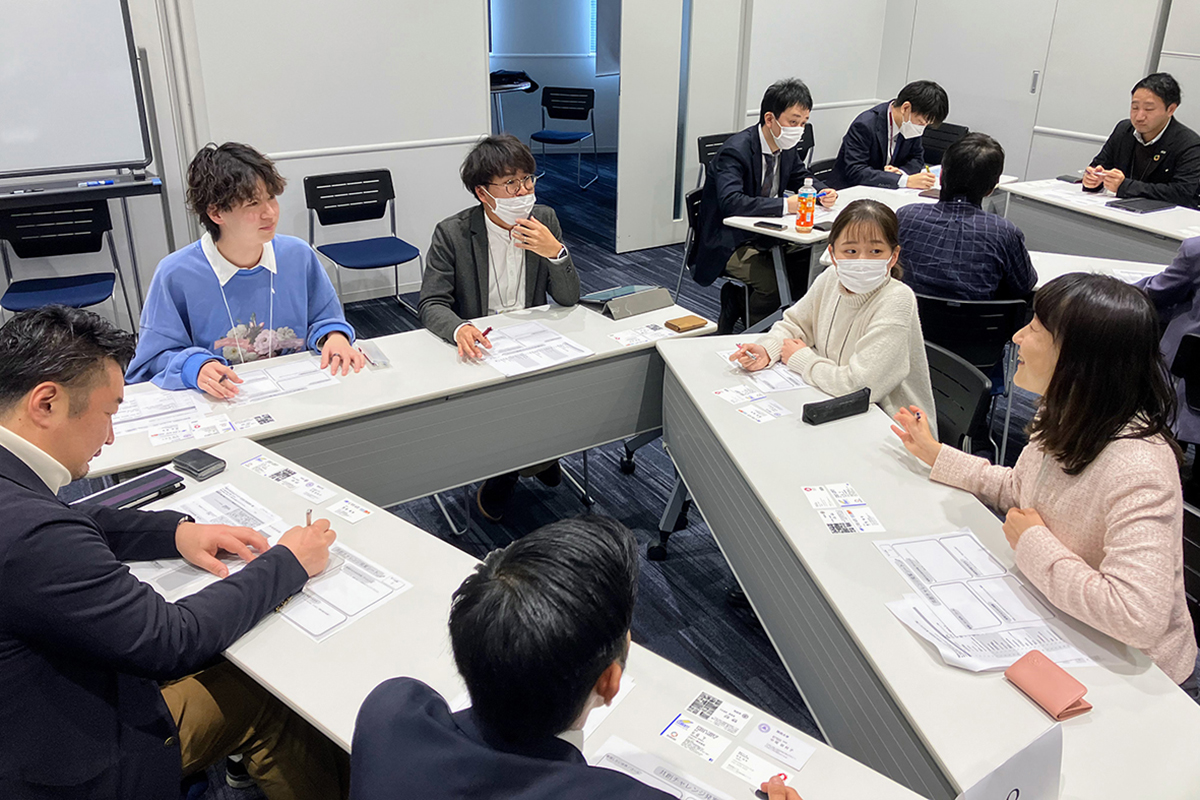
Other collaborations engage particular departments and seminars. The students in a seminar conducted by professor Kohei Yoshinaga of the Economic Policy Course in the Faculty of Economics participated in a project to plan environmental study tours in Kochi Prefecture in 2022 and 2023. The project was launched by Nikkan Sports News West Japan and the prefecture’s government. Last year’s program consisted of a workshop prior to a three-day trip to the Kochi towns of Yusuhara, Shimanto and Tsuno in November, and a workshop afterward for giving feedback.
In the previous workshop, the students learned the characteristics of the area as well as its challenges from a group of residents of Shimanto. During the three-day trip, the students visited a wood pellet plant, a sawmill and a logging site and participated in reforestation work by planting saplings to learn how the area’s forest resources are used and maintained in a sustainable way. They also experienced harvesting vegetables and various other activities to feel the blessings of nature. In the workshop after the trip, the students shared their feedback with the local people and organizations that participated in the project and discussed how the tour could be improved to better contribute to the realization of the SDGs.
In order to deepen ties with its partners in the SDGs Partner System and to facilitate collaboration among them, the university organized a get-together on March 1 this year, with about 100 people attending. The first half of the event consisted of lectures by professors and some invited guest speakers plus presentations by students, and the latter half was a workshop-style session where participants exchanged ideas about regional revitalization. The same kind of event has been held twice a year, resulting in new collaborations among some of the partners.
“We are committed to the achievement of the SDGs through research and development of new technologies, and we also have research institutes, such as the Carbon Neutrality Research Center, that can contribute to our commitment. At the same time, engaging students in our efforts and handing down this tradition to younger generations is also an important role that the university should play,” Maeda said.
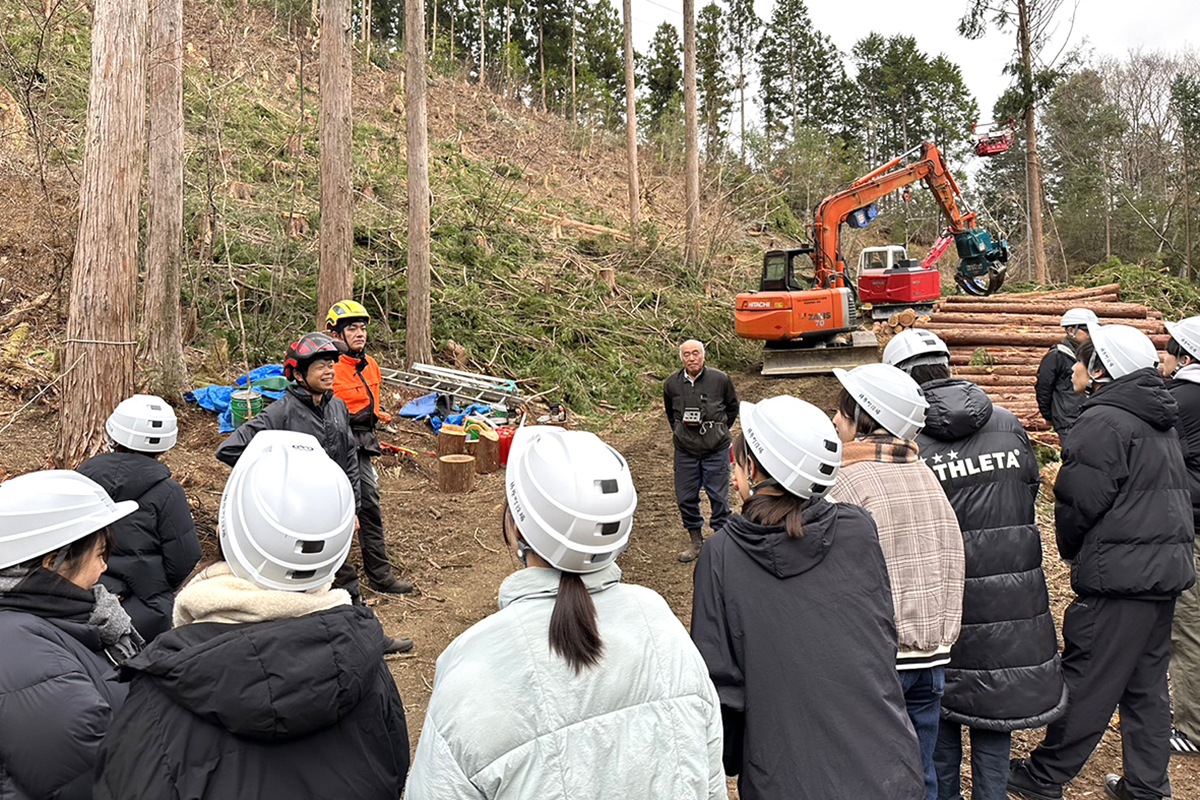
Expo 2025
Kansai University is welcoming and supporting Osaka’s Expo 2025 as another perfect opportunity for the university to advance its efforts to create a better future through collaborations between academia and industries. Kansai University was the only educational institution to be selected as one of the 26 companies and organizations participating in the Reborn Challenge, a project run by a committee managed by the Osaka Business Development Agency and the Osaka Chamber of Commerce and Industry in cooperation with the Osaka city and prefectural governments. The project supports selected small and medium-size businesses and organizations in exhibiting their technologies and achievements at the expo’s Osaka Healthcare Pavilion.
The university selected nine small and medium-size companies and startups developing technologies, products and services that can contribute in the areas of the environment, society, culture or health care. Through the exhibition, the university aims to present examples of successful fusion of academic and corporate resources and disseminate to the world Japanese companies’ potential and diversity.
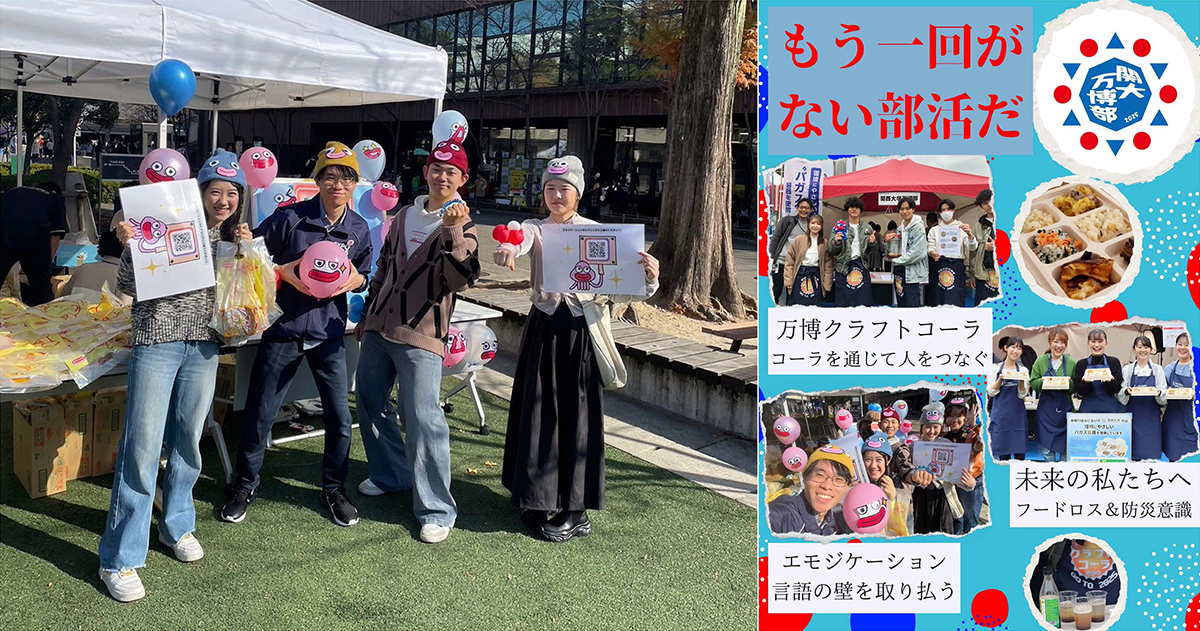
The university is also supporting the Team Expo 2025, a co-creation platform bringing together ideas, projects and activities aimed at building a better future, as well as partners interested in supporting such efforts. As a co-creation partner, the university is supporting a number of projects, such as a clean-up campaign by student groups at three universities, including Kansai University; the recycling of discarded clothes and contact lens blister packs; and the introduction of an umbrella-sharing service on campus.

There are also projects related to the expo that the university’s students are taking the initiative on. The university student expo team, Kandai Banpakubu, is producing a number of unique projects, including the Emojication Project — Emojication being a communication tool that they are developing to deliver messages using emoji created in Japan instead of languages. The project evolved from the students’ idea of sending invitation letters for the expo to various countries without using any particular language. The team aims to spread this tool to the world to help people overcome language barriers and build friendships, in the belief that being able to communicate while bypassing differences of culture and background will bring about a peaceful future based on kindness and equal relationships.
Beyond boundaries
This concept of transcending all borders is in line with what Maeda thinks will be the most important aspect of living in the coming era. He emphasized the importance of going beyond disciplinary boundaries and noted that acquiring methods and skills for learning is more fundamental than the actual absorption of the knowledge itself. “In the modern world, which is filled with information and knowledge, it is virtually impossible to master everything, even in one academic discipline in just several years at university and graduate school,” he said. “That is why the concept of ‘meta-knowledge’ (knowledge about knowledge) is crucial.”
He added that the same is true for culture and values. “There are different cultures and values, and looking at them from a higher perspective will give you the ability to capture their essences and create new values. That is the kind of education and training we aim to provide at Kansai University,” Maeda said.
Working from a solid base established over the course of a century, Kansai University continues to connect with society and nurture talented people who have the passion and the abilities required to meet the changing needs of the era of diversification.
Page 10 and page 11 are sponsored by Kansai University
Kansai University
3-3-35 Yamate-cho, Suitashi, Osaka 564-8680 Japan
https://www.kansai-u.ac.jp/English/?stt_lang=en
[email protected]





